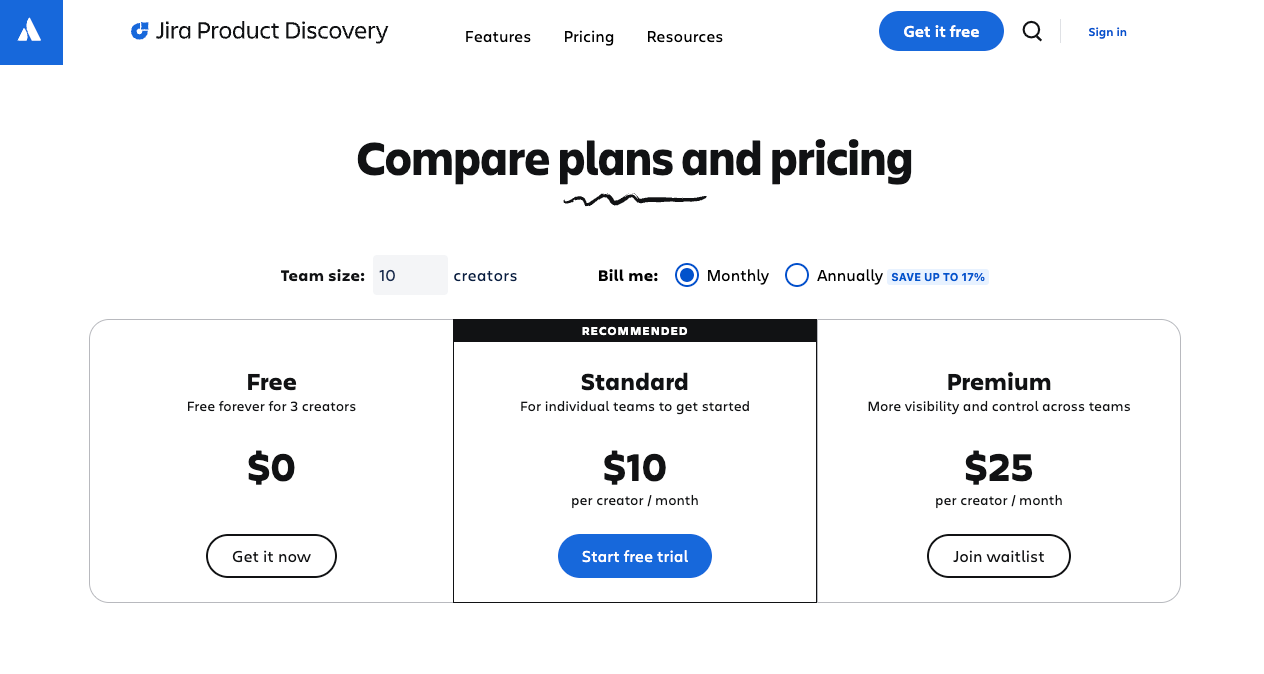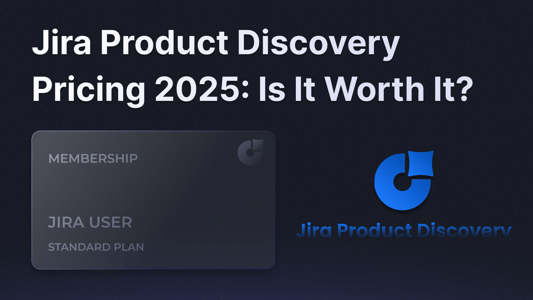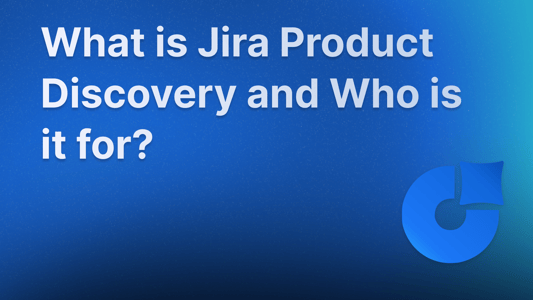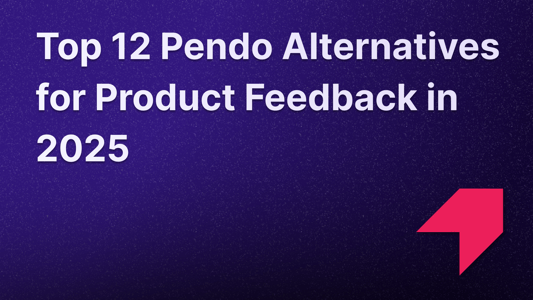Blog ComparisonsTop 10 Jira Product Discovery Alternatives in 2026
Top 10 Jira Product Discovery Alternatives in 2026
Use Jira and want to collect feedback? The native tool is okay, but there are much better Jira Product Discovery alternatives to try instead.
Mile Zivkovic
Content @ Featurebase

Jira Product Discovery is Atlassian's answer to many customer feedback tools dominating this space. While Jira and Confluence are excellent tools for project management and documentation, Atlassian wanted a tool to make feedback collection, management, analysis, and prioritization easy.
If you already use Jira as your project management tool, you may think that choosing Jira Product Discovery is the logical next move. However, this is far from the best product management platform in the world, so we prepared some excellent alternatives to consider instead. 👇
The Jira Product Discovery Alternatives in 2025
- ✨ Featurebase - Best all-in-one feedback and product management tool with voting, roadmaps, changelogs and a knowledge base.
- Nolt - Best for small teams looking for a simple customer feedback board with roadmaps and voting.
- Frill - Best for a lightweight feedback tool with a clean UI and simple roadmap management.
- Canny - Best for teams wanting a user-driven feedback platform with voting and roadmaps, suited for startups and enterprises.
- Ducalis - Best for structured feature prioritization with scoring frameworks but lacks strong feedback collection.
- Pendo - Best for product analytics and in-app feedback, ideal for enterprises managing large-scale customer insights.
- GitHub Discussions - Best for open-source and internal teams managing discussions but lacks prioritization tools.
- Trello - Best for visually organizing ideas and tasks with customizable Kanban boards.
- Mopinion - Best for website feedback and sentiment analysis, suited for e-commerce and customer experience teams.
- Aha! - Best for enterprise teams needing a complete product management suite with deep roadmapping and prioritization features.
But before choosing your one and only product management tool, let's see why Jira Product Discovery users are leaving this platform.
Why switch from Jira Product Discovery as a product management tool?
Jira Product Discovery is a feedback tool made primarily for internal feedback management and comes with its downsides. We have listed the key ones so you can know what to look for in a feedback tool.
- No public boards & feature voting
Jira Product Discovery only supports gathering ideas from product teams inside the company. This means you will have to manually insert all user-generated customer feedback by yourself instead of having a single place for users to do it for you. - Can't close the feedback loop with users
Jira Product Discovery doesn't offer a changelog for release notes or even public roadmaps to show users how far in progress their requests are. Most feedback tools also send automatic emails to users about the status of their posts to keep them in the loop and promote transparency. - No in-product widgets
There's no way to collect feedback natively from inside your app. The only way for users to leave feedback is by sending it to you via another channel first, which creates friction and adds more work for product managers, customer support teams, and others in your organization.
Considering that Jira Product Discovery pricing isn't all that horrible, these may not sound like such huge issues, but the reality is that you can get a better tool for the same price.
The 10 Best Jira Product Discovery Alternatives for Collecting Feedback
Looking for a sleeker, more efficient way to collect and manage user feedback? These feedback/product management tools are all better than Jira Product Discovery in one way or another. Let's look at the finest Jira Product Discovery competitors. 🔭
1. Featurebase ✨

Featurebase (👋 that's us) is a modern product management tool that helps SaaS companies collect user feedback, reduce support loads, and announce product changes. It’s loved by thousands of product, marketing, and support teams from companies like Nature.com, User.com, and Polymarket.
Instead of having 4+ different tools, Featurebase offers everything in one place to help you build products your users love:
- Feedback collection & roadmaps: Create a community where users can request, vote, and comment on features or ideas, fostering user engagement and collaboration. Create roadmaps and prioritize ideas by customers' revenue to build the most impactful features first.
- Changelog announcements: Announce product updates and increase feature adoption with neat in-app popups, notification emails, and a dedicated updates page.
- Help Center: Provide self-serve support with a beautiful knowledge base & bring help articles inside your product with a lightweight widget.
- Surveys (NPS, CSAT, etc.): Create targeted in-app surveys to ask users anything and measure customer satisfaction.
Plus, it integrates with your favorite tools already in your workflow, such as Linear, Slack, Intercom, Zendesk, and many more.
It comes with a Free plan and affordable pricing starting at $29 per user per month. You can try the paid plans without a credit card, so there's no downside to giving it a go.
✨ Start collecting & managing feedback with Featurebase for free →

2. Nolt.io

Nolt is a simple yet effective platform for collecting user feedback, tracking feature requests, and prioritizing product development. The voting system and structured roadmaps make it a strong alternative to Jira Product Discovery for teams seeking a cost-effective, no-frills feedback management tool.
Top features
- User voting on feature requests – Enable users to upvote and comment on ideas, making sure the most requested features get attention.
- Customizable feedback boards – Organize and categorize feedback to keep track of user needs and product improvements.
- Public and private product roadmaps – Share development plans with users or keep them internal for team collaboration.
- Automated changelogs – Keep users informed about new features and updates with built-in changelog announcements.
- Integrations with workflow tools – Connect with Slack, Trello, and Jira to facilitate collecting customer feedback.
How it’s better than Jira Product Discovery: It's a more affordable and straightforward solution, focuses on user-driven feedback with voting, and includes built-in roadmaps and changelog updates.
3. Frill

Frill helps teams gather user feedback, manage feature requests, and communicate product updates. Its minimalistic interface and focus on customer engagement make it a strong alternative to Jira Product Discovery for teams looking for a streamlined feedback and prioritization system.
Top features
- User voting on feature requests – Allow customers to upvote ideas, helping teams prioritize based on demand.
- Customizable feedback boards – Organize feedback and ideas into structured categories for better feedback management.
- Public and private roadmaps – Share development plans with users or keep them internal for team use. Facilitates backlog management and the creation of a cohesive product strategy.
- Automated changelog updates – Notify users about product updates and new feature releases.
- Integrations with project management tools – Connect with Jira, Slack, and Trello to sync feedback with development workflows.
How it’s better than Jira Product Discovery: Offers a simpler, more user-friendly interface, focuses on external user feedback, and includes built-in roadmaps and changelog updates to keep customers informed while freeing time for product managers.
4. Canny.io

Canny helps teams collect feature requests, track feedback, and prioritize development based on user input. The voting system and public roadmap features make it a strong alternative to Jira Product Discovery for teams that want a transparent, user-first approach to product planning.
Top features
- User voting on feature requests – Allow customers and internal teams to upvote suggestions, making prioritization more data-driven.
- Feedback boards for idea management – Organize feature requests, categorize feedback, and track trends over time.
- Public and private roadmaps – Share product plans with users or keep them internal for team use.
- Changelog announcements – Notify users about completed features and improvements directly within the platform.
- Integration with development tools – Connect with Jira, Intercom, and Slack to sync feedback with engineering workflows.
How it’s better than Jira Product Discovery: Focuses more on external user feedback, includes voting for prioritization, and provides a built-in roadmap for increased transparency. However, Canny pricing may be a hurdle for some businesses.
5. Ducalis

Ducalis helps teams score and rank product ideas based on impact, effort, and business value. The structured prioritization framework makes it a strong alternative to Jira Product Discovery for teams looking to evaluate and align their product decisions.
Top features
- Custom scoring frameworks – Rank product ideas based on effort, customer demand, revenue potential, or other weighted criteria.
- Collaborative prioritization – Allow teams to vote, comment, and align on product priorities in a shared workspace.
- Two-way integrations – Sync with Jira, Trello, ClickUp, and other tools to connect prioritization workflows.
- RICE and ICE models – Use predefined prioritization methods or customize frameworks to fit team needs.
- Kanban and backlog views – Organize ideas visually with board-style tracking and backlog lists.
How it’s better than Jira Product Discovery: Has advanced prioritization frameworks, supports real-time team collaboration on scoring and integrates with multiple project management tools for workflow flexibility.
6. Pendo

Pendo helps teams collect user feedback, track product usage, and prioritize features based on real customer behavior. Combining qualitative and quantitative data, it is a strong but expensive alternative to Jira Product Discovery for teams focused on data-driven decision-making.
Top features
- Product usage analytics – Track how users interact with features to identify opportunities for improvement.
- In-app feedback collection – Gather insights directly from users through embedded surveys and feedback widgets.
- Segmentation and targeting – Filter feedback and analytics by user type, behavior, or demographics.
- Feature adoption tracking – Monitor how often new features are used to measure their success.
- Roadmaps and prioritization – Organize insights into a structured roadmap to align teams on product direction.
How it’s better than Jira Product Discovery: Pendo combines real-time product usage analytics with in-app feedback tools, enabling teams to prioritize features based on actual customer behavior.
7. GitHub Discussions

GitHub Discussions provides an interactive forum for teams to collect ideas, discuss product improvements, and engage with users. Directly integrated into GitHub repositories, it serves as a strong alternative to Jira Product Discovery for teams that want to incorporate community-driven feedback into their development process.
Top features
- Threaded discussions – Organize product ideas, feedback, and feature requests into structured conversations.
- Upvoting and reactions – Allow team members and users to highlight important ideas by voting on discussions.
- Integration with GitHub issues – Convert discussions into actionable GitHub issues to streamline feature development.
- Access controls and moderation tools – Manage permissions and moderate discussions to keep conversations productive.
- Community-driven insights – Gather input from developers, stakeholders, and users within a familiar GitHub environment.
How it’s better than Jira Product Discovery: Provides a more open and community-driven approach to product feedback, integrates directly with GitHub issues, and enables upvoting to highlight popular ideas.
8. Trello

Trello offers a simple and highly visual approach to product discovery, making organizing and prioritizing ideas easy. The Kanban-style board system helps teams collaborate on feature planning and track product development progress.
Top features
- Customizable Kanban boards – Organize product ideas into visual lists, allowing teams to move items through different stages.
- Labels, filters, and automation – Categorize ideas, set priorities, and automate repetitive tasks with built-in workflow rules.
- Collaboration and commenting – Discuss ideas, tag teammates, and track conversations within individual Trello cards.
- Power-Up integrations – Enhance functionality by connecting with tools like Jira, Slack, and Google Drive.
- Templates for product management – Use pre-built templates for roadmaps, idea tracking, and backlog prioritization.
How it’s better than Jira Product Discovery: Offers a more intuitive, lightweight interface, customizable boards for idea tracking, and flexible Power-Up integrations for enhanced functionality.
9. Mopinion

Mopinion is a user feedback and product discovery tool designed to collect, analyze, and act on customer insights. Its focus on user-driven decision-making means that Mopinion is a strong alternative to Jira Product Discovery for teams prioritizing direct customer feedback in their product planning.
Top features
- Multi-channel feedback collection – Gather insights from websites, mobile apps, and email to get a complete view of user needs.
- Sentiment analysis and AI-driven insights – Use AI to categorize feedback, detect trends, and identify high-priority issues.
- Custom feedback forms and surveys – Design tailored forms to collect specific insights from users and customers.
- Integration with product management tools – Connect with Jira, Slack, and other tools to funnel feedback into existing workflows.
- Real-time dashboards and analytics – Visualize user sentiment, pain points, and trends to make data-driven product decisions.
How it’s better than Jira Product Discovery: Focuses more on direct user feedback, includes AI-powered sentiment analysis, and supports multi-channel feedback collection for broader insights.
10. Aha! Ideas

Aha! is a comprehensive product management platform designed to help teams collect ideas, prioritize features, and build strategic roadmaps. Its extensive customization and workflow automation make it a strong alternative to Jira Product Discovery for teams seeking a structured approach to product planning. Despite its steep learning curve, it's an extremely popular roadmapping tool.
Top features
- Idea collection and prioritization – Gather ideas from users, customers, and teams, then score and rank them based on impact.
- Customizable product roadmaps – Build detailed roadmaps with timelines, dependencies, and strategic goals to align teams.
- Workflow automation – Automate approval processes, notifications, and status updates to streamline product management.
- Integration with development tools – Sync seamlessly with Jira, Azure DevOps, and GitHub to connect roadmaps with engineering workflows.
- Reports and analytics – Track product performance, measure progress, and visualize idea impact with built-in reporting tools.
How it’s better than Jira Product Discovery: Provides more advanced roadmap customization, deeper reporting and analytics, and built-in workflow automation to streamline product decision-making.
What is Jira Product Discovery?

Jira Product Discovery provides a place for product teams to store and prioritize their ideas and feedback. It helps in organizing the team's focus on impactful projects by simplifying the process of creating actionable plans.
This tool also bridges the gap between business and technical teams by linking planning directly to Jira Software. It aims to cut down on update time and align everyone on project goals, facilitating smoother progress on product development.
How much does Jira Product Discovery cost?

The pricing for Jira Product Discovery is pretty straightforward:
- The Free plan—You get up to 3 creators, unlimited contributions per site, 200 rule runs per month, project workflows, and project roles.
- The Standard plan ($10/creator/month)—You can get unlimited creators, 250GB of file storage, and 500 rule runs per month. On top of everything from the Free plan, you also get custom project roles and data residency.
- The Premium plan ($25/creator/month)—On top of unlimited creators, it includes unlimited file storage and 1,000 monthly rule runs. Only plan that includes Roadmaps and view permissions.
It doesn't seem too expensive at first. However, if you take into account the 'per creator' pricing and compare its functionality to alternatives, it's quite a lot.
You can pay the same price for much more complete tools offering more seats and even get many of these features for free.
Key features of Jira Product Discovery:
Jira Product Discovery offers many core features that most feedback tools do. This includes:
- Feedback boards - let users submit ideas and upvote others' posts
- Roadmaps - display upcoming features and manage ideas on a roadmap view
- Integrations - connect Jira Product Discovery with popular tools like Salesforce, Slack, and Zendesk
- Prioritizing ideas - give each idea a score using the method that works best for you
- Deep integration with Jira - connect your product roadmap and ideas with epics in Jira Software
Conclusion
If you think that as an existing Jira Service Management user, it makes more sense to opt for Jira Product Discovery, you're wrong. While this tool has its merits for product teams, it's a classic case of too little, too late. Other tools are better for feedback management and collection, cross-functional collaboration, and simply creating a better product.
Featurebase is one of the best Jira Product Discovery alternatives. It has all the matching features and much more for an even lower price. Besides feedback boards, it offers roadmaps, changelogs, in-app widgets, and a Help Center - all with a beautiful and intuitive design.
It comes with a Free Plan that allows unlimited feedback. You can automatically migrate over from Jira Product Discovery in minutes, so there's no downside to trying it. 👇
✨ Start collecting & managing feedback with Featurebase for free →





